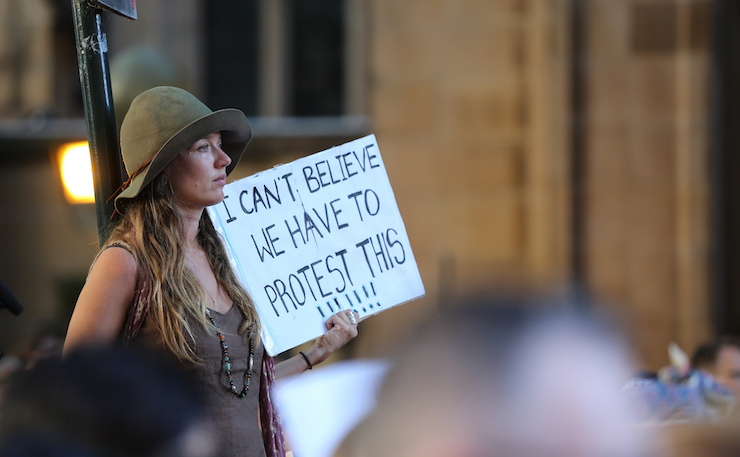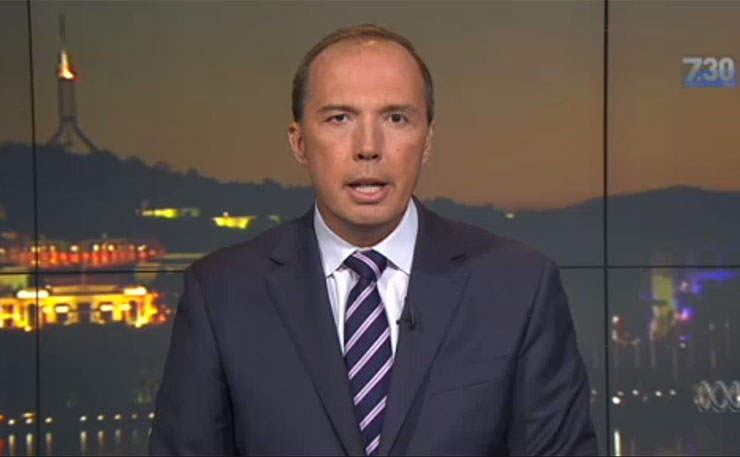A new report shines a light on the growing powers of the Minister. When norms like the presumption of innocence are challenged, we all lose, writes Max Chalmers.
Imagine a neighbour accuses you of a crime. The police investigate and file charges. It’s a minor crime, the neighbour says you stole a lawnmower, but their anger spurs police to push ahead. Before the case is complete the police drop the charges; the lawnmower turns up at the back of the neighbour’s shed.
For an Australian citizen, that would be the end of the matter. For an asylum seeker living in the community as their application is processed, the same encounter could well result in an indefinite period behind bars.
Since the Coalition government decided to start turning boats of asylum seekers back to sea – more or less regardless of the age, condition, or experiences of those on board – the composition of Australia’s onshore detention centres has changed.
New Zealanders are now the largest cohort in detention, mostly people who have fallen foul of Section 501 of the Migration Act, which allows the Minister for Immigration to cancel a visa on the basis of that elusive trait, “character”.
With people who have lived most of their lives in Australia being deported in significant numbers, the Minister’s discretion has drawn consistent attention and criticism. But far less discussed has been the impact of a law allowing the Minister to effectively preside over the lives of asylum seekers like an absent judge, second-guessing the actual judiciary.

The powers relate to people on bridging visas, those who arrived by boat and are now living in the community while waiting for their refugee claims to be assessed. When somebody in this position is charged with a crime, the Minister has the power to return them to detention as soon as the charges are laid.
That may sound benign, but thanks to a recent report from the Commonwealth Ombudsman, as well as the work of the volunteers and advocates who visit our detention centres, we know just how fraught, unfair, and capricious the process that follows tends to be.
The first problem is that people are being returned to detention merely for being alleged to have committed minor crimes.
Do we need to send someone to indefinite detention for allegedly shoplifting? We know detention erodes physiological wellbeing. It causes tangible suffering. In cases where the alleged transgression is minor, the harm done by detaining the individual is far greater than the risk to the community posed by allowing them to remain free.
This point was not missed in the Ombudsman’s report. “Because this cohort consists of people seeking asylum, many have a history of torture and trauma and are therefore significantly impacted by re-detention, especially because their future is uncertain,” it noted.
While the Department insists otherwise, the Ombudsman’s report suggests the Minister is regularly cancelling asylum seekers’ visas when only minor charges are laid. Even in cases where a court grants bail, the Minister is deciding to return people to detention.
The second problem with the way this law is being applied is that once an asylum seeker is returned to detention, the path back to freedom is long and unclear, even if they are innocent.
When a visa is cancelled it can’t simply be uncancelled. That means even if the charges against the person are dropped – the police admit they don’t have the evidence needed for the case to go ahead – the person remains detained, as if they had been convicted of a crime.
The same problem applies when they beat the charges. The Minister has to be informed of the case and review it, then sign off on a new visa. There’s no set timeframe for this and, evidently, it moves extremely slowly.

One real world example in the Ombudsman’s report is the case of Mr X, a man on a bridging visa who was charged with “behaving in an offensive manner”. Not exactly murder, but even a low-level allegation like this meant he was returned to detention.
The charges against Mr X were dropped. Yet it took more than a year for the Minister to eventually exercise discretion and grant Mr X a new visa, freeing him from detention. To put this another way, a man seeking asylum in Australia spent more than a year incarcerated for not facing a minor allegation.
Peter Dutton would no doubt argue this hardline stance is designed to keep the community safe. The kindest possible interpretation is that his office has calculated that a significant harm to an asylum seeker (a year in detention) is less of a problem than a minor harm to an Australian citizen (a potential act of petty theft for example). More likely, Dutton has realised that there is no political consequence to inflicting suffering on people without political influence who cannot vote, while some gain to be made by this tough-on-crime, tough-on-refos approach.
Dutton loses little by tipping the scales against justice. But the rest of us do.
By undermining fundamental aspects of our criminal justice system including the presumption of innocence, the government gnaws away at the norms we all rely on. Power is moved from the courts and into the hands of the Minister. Behind this policy is a perilous proposition: criminal courts and an independent judiciary are not sufficient, you must have a strongman behind the law with the power to take a person’s freedom away based on suspicion alone.
When advocates warn that the power of the Immigration Minister has grown in recent years, this is what inspires their fear. The mistreatment of refugees is never just that.
For asylum seekers, an already vulnerable group, this is not an abstract problem. When allegations against a certain group can deprive liberty without being tested, power is asymmetrically distributed. If a citizen is having an altercation or disagreement with an asylum seeker – or they simply want to gain leverage over them – they know they can use the threat of calling in the cops over a minor alleged transgression.
People break the law in small ways all the time, that’s why we have a legal system with the discretion to keep people out of prison for small breaches. For you or I it’s not such a problem. For an asylum seeker, possessing marijuana or being rude to a police officer could mean the end of their freedom.
Removing the discretion granted to judges and placing it in the hands of Peter Dutton has seen innocent people spend lengthy periods in detention. The Department of Immigration claims to use detention as a last resort. If that is true, it will take up the Ombudsman’s recommendations and stop playing the role of judge, jury, and jailer.
Donate To New Matilda
New Matilda is a small, independent media outlet. We survive through reader contributions, and never losing a lawsuit. If you got something from this article, giving something back helps us to continue speaking truth to power. Every little bit counts.






